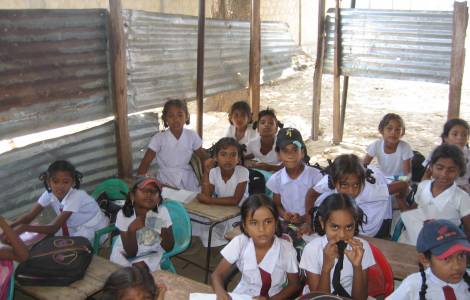
Irin
Colombo (Agenzia Fides) - The Church in Sri Lanka is strongly committed to promoting religious harmony and to building a peaceful and reconciled society, after the wounds of the civil war. Christians try to be present in all parts of society, through social services, educational programs and health services: is what Sister W. Jeewani Fernando, of the Sisters of the Immaculate Conception of Castres, explains to Agenzia Fides. The leaders of different religions - she notes - have formed a common movement to promote religious harmony and peace in society.
"We are called to live in peace and harmony and to work for the common good of society The Church is trying to relate to other religious communities with solidarity and love", adds Sister Fernando, noting that "the responsibility of working for the progress of Sri Lankan society belongs to everyone".
Sri Lanka, an island nation, has suffered a lot in the past due to civil war and guerrilla movements. After the end of the civil war between Singhalese and Tamil "the nation is gradually making efforts to strengthen peace and harmony", says the religious.
In Sri Lanka, a nation of 21 million people, tensions are focused on the differences between the Singhalese ethnic majority, which represents about 74% of the population, and a Tamil ethnic minority, made up of Hindus and Christians. A Muslim community mostly descended from Arab and Malaysian merchants, is added in the composition of society.
A certain nationalist movement, religiously influenced, began in the years after independence (1948), when a Singhalese-Buddhist coalition led by Solomon Bandaranaike tried to support the majority, in response to accusations that the British colonial government had favored the Tamils for work in the public administration. This rebirth of Buddhist nationalism was opposed by the Tamils and therefore ethnic-based tensions and violence degenerated into a civil war during which over 100,000 lives were lost before the Tamil insurgents were finally defeated in 2009.
Currently, while the economy is in a fragile state, extremism and nationalism thrive in situations of general malaise. To complicate matters, it should be noted that Sri Lankan Buddhists follow the Theravada tradition which is more conservative than the Mahayana tradition.
While Buddhists are more than 70% of the population (already 200 B.C. Buddhism was an official religion in Sri Lanka), Hindus make up 16% of the population and are dominant in the northern and eastern provinces of the island. About 8% of the inhabitants of Sri Lanka belong to Islam (arrived in the fifteenth century with Arab traders), while Christians make up 8% of the Sri Lankan population, and are mainly Catholics.
Christianity first came to Sri Lanka when the Portuguese arrived in the 16th century. Catholicism spread and many Catholic schools were established for the Singhalese and Tamil. With the arrival of the Dutch the Dutch Reformed Church spread and in 1772 Christians were 21% of the population, a percentage that fell with the end of the colonial rule. (SD) (Agenzia Fides, 15/1/2017)